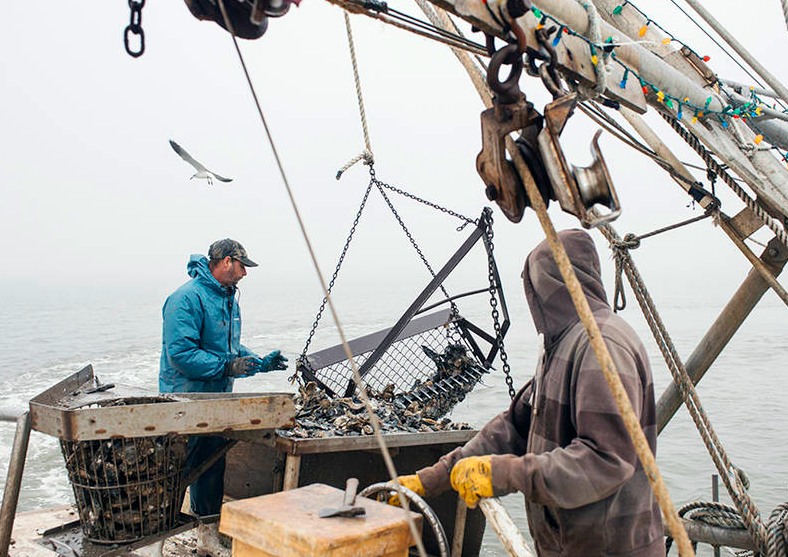
Harvesting oysters in the Gulf of Mexico Photo: Spike Johnson, Inside Climate News
Warming ocean temperatures are causing massive changes for fishermen, some of which may force them out of business, according to several recent stories examining the impacts of climate change on the fishing industry. Various valuable fish species all around the U.S. and the globe, from Alaska to the Gulf of Mexico to the North Atlantic, are shifting to the north to avoid warmer waters and also are being impacted by new threats caused by ocean warming and acidification.
- Inside Climate News in November reported on a study by the Alfred Wegener Institute for Polar and Ocean Research which found that Atlantic cod hatchling numbers around Norway and Iceland will decline 60 percent if temperatures warm more than 3 degrees Celsius above pre-industrial times—considered likely in the second half of this century if greenhouse gas emissions aren’t cut back significantly.
- The Wall Street Journal chronicled the increasing challenges for the crews of the fishing vessel Oracle that catches halibut in the Deadliest Catch waters of the Bering Sea off Alaska. This past fall, the Oracle twice sailed 800 miles north from the seaport of Dutch Harbor in the Aleutian Islands, before finding the halibut that a decade ago lived several hundred miles closer to home. Each voyage took twice as long and yielded half as many fish.
- Inside Climate News in December told the story of oystermen in the Gulf of Mexico, like Scooter Machacek, whose family has been working the Gulf Coast of Texas for four generations. Machacek described how it took “seven hours to gather just 13 hundred-pound sacks of oysters … a pitiful haul, less than half of the allowable daily limit of 30 sacks, which itself was a fraction of the 140-sack limit allowed in the heyday of the 1980s.”
As Inside Climate News explained, “From cheap food imports to hurricanes fueled by a warming planet, these systems support, or strain, the tapestry of what it takes to get seafood to the dinner plates of diners.” However, not everyone is a loser in this warming scenario — the Wall Street Journal describes how “[o]ff Rhode Island, newly booming fisheries include not just black sea bass but also squid and Jonah crab, an edible species with big, dark-brown claws.”
Why This Matters: Warming waters that shift fish populations make a barely viable business downright impossible for many small and medium-sized fishing operations. Not to mention the additional fuel and time it takes to chase fewer fish, that are now found farther from ports. Watching this play out is painful in U.S. fishing communities, but for many parts of the world, it could become a real food security crisis. The U.S. government currently is very lethargic in changing its fisheries management schemes even as the evidence of shifting fish populations grows. Given the challenges of climate change, a more engaged approach to fisheries management that takes climate change into account is needed. It will benefit the fishermen and the fish populations as well.
January 8, 2019 » climate change, cod, communities, fish, fisheries, Gulf of Mexico, management, ocean acidification, ocean warming, oysters


